Fleurs du Mal Magazine


Or see the index
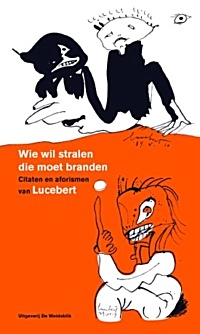 ‘Alles van waarde is weerloos’, staat er in grote neonletters op het dak van een Nederlandse verzekeraar. Het is een tot aforisme, zelfs tot spreekwoord geworden versregel van Lucebert.
‘Alles van waarde is weerloos’, staat er in grote neonletters op het dak van een Nederlandse verzekeraar. Het is een tot aforisme, zelfs tot spreekwoord geworden versregel van Lucebert.
Lucebert werd en wordt weleens getypeerd als een ontoegankelijk dichter. Des te opmerkelijker is het hoeveel sporen hij heeft achtergelaten in de omgangstaal. In tal van niet-literaire teksten wordt onnadrukkelijk of juist expliciet verwezen naar passages uit zijn gedichten: ‘de ruimte van het volledig leven’, ‘omroeper van oproer’, ‘dichters van fluweel’, ‘het proefondervindelijk gedicht’, ‘de blote kont van de kunst’, ‘ritselende revolutie’, ‘overal zanikt bagger’ – het is maar een greep uit het dichterlijk erfgoed van Lucebert dat zich in de omgangstaal heeft genesteld.
In Wie wil stralen die moet branden zijn deze citaten en aforismen uit het oeuvre van Lucebert bijeengebracht door Ton den Boon (hoofdredacteur van de Dikke Van Dale), die daarbij een inleiding schreef over de invloed van Lucebert op de Nederlandse taal. Het boekje is verlucht met niet eerder gepubliceerde tekeningen van Lucebert.
Wie wil stralen die moet branden.
Citaten en aforismen van Lucebert – Lucebert, Ton den Boon
Auteurs: Lucebert, Ton den Boon
Vormgeving: Huug Schipper, Studio Tint
Omvang: 96 pagina’s
Afwerking: paperback
Formaat: 12 x 20 cm
ISBN: 9789077767658
€ 7,50
Verschijning: september 2016, De Weideblik
De Weideblik is een middelgrote uitgeverij, gespecialiseerd in uitgaven op het gebied van de beeldende kunst. Veel van onze boeken worden gemaakt in nauwe samenwerking met een kunstenaar (of diens nazaten) en/of een tentoonstellingsinstelling.
# Meer info website Uitgeverij Weideblik
fleursdumal.nl magazine
More in: - Book News, - Bookstores, Archive K-L, Lucebert, Lucebert
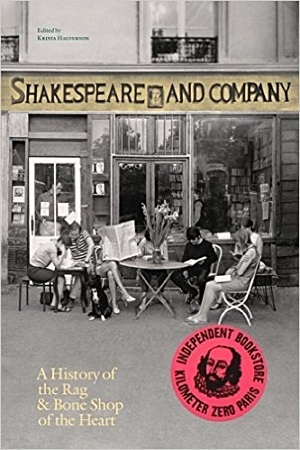 A Biography of a Bookstore – Shakespeare and Company, Paris: A History of the Rag & Bone Shop of the Heart – by Krista Halverson (Editor) – Sylvia Whitman (Afterword) – Jeannette Winterson (Foreword)
A Biography of a Bookstore – Shakespeare and Company, Paris: A History of the Rag & Bone Shop of the Heart – by Krista Halverson (Editor) – Sylvia Whitman (Afterword) – Jeannette Winterson (Foreword)
A copiously illustrated account of the famed Paris bookstore on its 65th anniversary.
For almost 70 years, Shakespeare and Company has been a home-away-from-home for celebrated writers—including James Baldwin, Jorge Luis Borges, A. M. Homes, and Dave Eggers—as well as for young, aspiring authors and poets. Visitors are invited to read in the library, share a pot of tea, and sometimes even live in the shop itself, sleeping in beds tucked among the towering shelves of books. Since 1951, more than 30,000 have slept at the “rag and bone shop of the heart.”
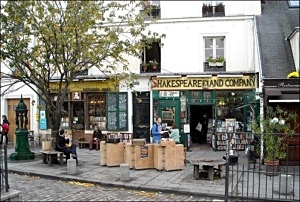 This first-ever history of the legendary bohemian bookstore in Paris interweaves essays and poetry from dozens of writers associated with the shop–Allen Ginsberg, Anaïs Nin, Ethan Hawke, Robert Stone and Jeanette Winterson, among others–with hundreds of never-before-seen archival pieces, including photographs of James Baldwin, William Burroughs and Langston Hughes, plus a foreword by the celebrated British novelist Jeanette Winterson and an epilogue by Sylvia Whitman, the daughter of the store’s founder, George Whitman. The book has been edited by Krista Halverson, director of the newly founded Shakespeare and Company publishing house.
This first-ever history of the legendary bohemian bookstore in Paris interweaves essays and poetry from dozens of writers associated with the shop–Allen Ginsberg, Anaïs Nin, Ethan Hawke, Robert Stone and Jeanette Winterson, among others–with hundreds of never-before-seen archival pieces, including photographs of James Baldwin, William Burroughs and Langston Hughes, plus a foreword by the celebrated British novelist Jeanette Winterson and an epilogue by Sylvia Whitman, the daughter of the store’s founder, George Whitman. The book has been edited by Krista Halverson, director of the newly founded Shakespeare and Company publishing house.
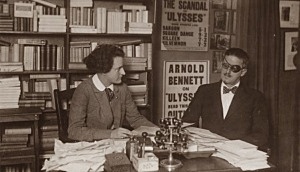 George Whitman opened his bookstore in a tumbledown 16th-century building just across the Seine from Notre-Dame in 1951, a decade after the original Shakespeare and Company had closed. Run by Sylvia Beach, it had been the meeting place for the Lost Generation and the first publisher of James Joyce’s Ulysses. (This book includes an illustrated adaptation of Beach’s memoir.) Since Whitman picked up the mantle, Shakespeare and Company has served as a home-away-from-home for many celebrated writers, from Jorge Luis Borges to Ray Bradbury, A.M. Homes to Dave Eggers, as well as for young authors and poets. Visitors are invited not only to read the books in the library and to share a pot of tea, but sometimes also to live in the bookstore itself–all for free.
George Whitman opened his bookstore in a tumbledown 16th-century building just across the Seine from Notre-Dame in 1951, a decade after the original Shakespeare and Company had closed. Run by Sylvia Beach, it had been the meeting place for the Lost Generation and the first publisher of James Joyce’s Ulysses. (This book includes an illustrated adaptation of Beach’s memoir.) Since Whitman picked up the mantle, Shakespeare and Company has served as a home-away-from-home for many celebrated writers, from Jorge Luis Borges to Ray Bradbury, A.M. Homes to Dave Eggers, as well as for young authors and poets. Visitors are invited not only to read the books in the library and to share a pot of tea, but sometimes also to live in the bookstore itself–all for free.
More than 30,000 people have stayed at Shakespeare and Company, fulfilling Whitman’s vision of a “socialist utopia masquerading as a bookstore.” Through the prism of the shop’s history, the book traces the lives of literary expats in Paris from 1951 to the present, touching on the Beat Generation, civil rights, May ’68 and the feminist movement–all while pondering that perennial literary question, “What is it about writers and Paris?”
 In this first-ever history of the bookstore, photographs and ephemera are woven together with personal essays, diary entries, and poems from writers including Allen Ginsberg, Anaïs Nin, Lawrence Ferlinghetti, Sylvia Beach, Nathan Englander, Dervla Murphy, Jeet Thayil, David Rakoff, Ian Rankin, Kate Tempest, and Ethan Hawke.
In this first-ever history of the bookstore, photographs and ephemera are woven together with personal essays, diary entries, and poems from writers including Allen Ginsberg, Anaïs Nin, Lawrence Ferlinghetti, Sylvia Beach, Nathan Englander, Dervla Murphy, Jeet Thayil, David Rakoff, Ian Rankin, Kate Tempest, and Ethan Hawke.
With hundreds of images, it features Tumbleweed autobiographies, precious historical documents, and beautiful photographs, including ones of such renowned guests as William Burroughs, Henry Miller, Langston Hughes, Alberto Moravia, Zadie Smith, Jimmy Page, and Marilynne Robinson.
Tracing more than 100 years in the French capital, the book touches on the Lost Generation and the Beats, the Cold War, May ’68, and the feminist movement—all while reflecting on the timeless allure of bohemian life in Paris.
 Krista Halverson is the director of Shakespeare and Company bookstore’s publishing venture. Previously, she was the managing editor of Zoetrope: All-Story, the art and literary quarterly published by Francis Ford Coppola, which has won several National Magazine Awards for Fiction and numerous design prizes. She was responsible for the magazine’s art direction, working with guest designers including Lou Reed, Kara Walker, Mikhail Baryshnikov, Zaha Hadid, Wim Wenders and Tom Waits, among others.
Krista Halverson is the director of Shakespeare and Company bookstore’s publishing venture. Previously, she was the managing editor of Zoetrope: All-Story, the art and literary quarterly published by Francis Ford Coppola, which has won several National Magazine Awards for Fiction and numerous design prizes. She was responsible for the magazine’s art direction, working with guest designers including Lou Reed, Kara Walker, Mikhail Baryshnikov, Zaha Hadid, Wim Wenders and Tom Waits, among others.
Jeanette Winterson‘s first novel, Oranges Are Not the Only Fruit, was published in 1985. In 1992 she was one of Granta’s Best of Young British Novelists. She has won numerous awards and is published around the world. Her memoir, Why Be Happy When You Could Be Normal?, was an international bestseller. Her latest novel, The Gap of Time, is a “cover version” of Shakespeare’s The Winter’s Tale.
Sylvia Whitman is the owner of Shakespeare and Company bookstore, which her father opened in 1951. She took on management of the shop in 2004, when she was 23, and now co-manages the bookstore with her partner, David Delannet. Together they have opened an adjoining cafe, as well as launched a literary festival, a contest for unpublished novellas, and a publishing arm.
“I created this bookstore like a man would write a novel, building each room like a chapter, and I like people to open the door the way they open a book, a book that leads into a magic world in their imaginations.” —George Whitman, founder
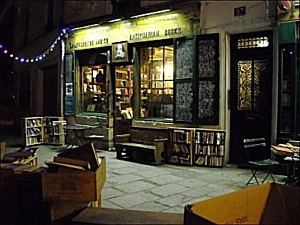 Drawing on a century’s worth of never-before-seen archives, this first history of the bookstore features more than 300 images and 70 editorial contributions from shop visitors such as Allen Ginsberg, Anaïs Nin, Kate Tempest, and Ethan Hawke. With a foreword by Jeanette Winterson and an epilogue by Sylvia Whitman, the 400-page book is fully illustrated with color throughout.
Drawing on a century’s worth of never-before-seen archives, this first history of the bookstore features more than 300 images and 70 editorial contributions from shop visitors such as Allen Ginsberg, Anaïs Nin, Kate Tempest, and Ethan Hawke. With a foreword by Jeanette Winterson and an epilogue by Sylvia Whitman, the 400-page book is fully illustrated with color throughout.
Shakespeare and Company, Paris: A History of the Rag & Bone Shop of the Heart by Krista Halverson
Foreword by: Jeanette Winterson
Epilogue by: Sylvia Whitman
Contributions by:
Allen Ginsberg
Anaïs Nin
Lawrence Ferlinghetti
Sylvia Beach
Nathan Englander
Dervla Murphy
Ian Rankin
Kate Tempest
Ethan Hawke
David Rakoff
Publisher: Shakespeare and Company Paris
Publication date: August 2016
Hardback – ISBN: 979-1-09610-100-9
€ 35.00
Publication country:France
Pages:384
Weight: 1501.000g.
# More information on website Shakespeare & Company
Photos: Shakespeare & Comp, Jef van Kempen FDM
fleursdumal.nl magazine
More in: - Book Lovers, - Book News, - Book Stories, - Bookstores, Art & Literature News, BEAT GENERATION, Borges J.L., Burroughs, William S., Ernest Hemingway, Ginsberg, Allen, J.A. Woolf, James Baldwin, Kate/Kae Tempest, Samuel Beckett, Shakespeare, William, Tempest, Kate/Kae
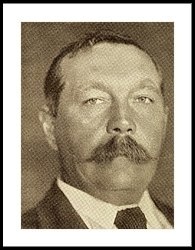 His First Operation
His First Operation
by Arthur Conan Doyle
It was the first day of the winter session, and the third year’s man was walking with the first year’s man. Twelve o’clock was just booming out from the Tron Church.
“Let me see,” said the third year’s man. “You have never seen an operation?”
“Never.”
“Then this way, please. This is Rutherford’s historic bar. A glass of sherry, please, for this gentleman. You are rather sensitive, are you not?”
“My nerves are not very strong, I am afraid.”
“Hum! Another glass of sherry for this gentleman. We are going to an operation now, you know.”
The novice squared his shoulders and made a gallant attempt to look unconcerned.
“Nothing very bad—eh?”
“Well, yes—pretty bad.”
“An—an amputation?”
“No; it’s a bigger affair than that.”
“I think—I think they must be expecting me at home.”
“There’s no sense in funking. If you don’t go to-day, you must to-morrow. Better get it over at once. Feel pretty fit?”
“Oh, yes; all right!” The smile was not a success.
“One more glass of sherry, then. Now come on or we shall be late. I want you to be well in front.”
“Surely that is not necessary.”
“Oh, it is far better! What a drove of students! There are plenty of new men among them. You can tell them easily enough, can’t you? If they were going down to be operated upon themselves, they could not look whiter.”
“I don’t think I should look as white.”
“Well, I was just the same myself. But the feeling soon wears off. You see a fellow with a face like plaster, and before the week is out he is eating his lunch in the dissecting rooms. I’ll tell you all about the case when we get to the theatre.”
The students were pouring down the sloping street which led to the infirmary—each with his little sheaf of note-books in his hand. There were pale, frightened lads, fresh from the high schools, and callous old chronics, whose generation had passed on and left them. They swept in an unbroken, tumultuous stream from the university gate to the hospital. The figures and gait of the men were young, but there was little youth in most of their faces. Some looked as if they ate too little—a few as if they drank too much. Tall and short, tweed-coated and black, round-shouldered, bespectacled, and slim, they crowded with clatter of feet and rattle of sticks through the hospital gate. Now and again they thickened into two lines, as the carriage of a surgeon of the staff rolled over the cobblestones between.
“There’s going to be a crowd at Archer’s,” whispered the senior man with suppressed excitement. “It is grand to see him at work. I’ve seen him jab all round the aorta until it made me jumpy to watch him. This way, and mind the whitewash.”
They passed under an archway and down a long, stone-flagged corridor, with drab-coloured doors on either side, each marked with a number. Some of them were ajar, and the novice glanced into them with tingling nerves. He was reassured to catch a glimpse of cheery fires, lines of white-counterpaned beds, and a profusion of coloured texts upon the wall. The corridor opened upon a small hall, with a fringe of poorly clad people seated all round upon benches. A young man, with a pair of scissors stuck like a flower in his buttonhole and a note-book in his hand, was passing from one to the other, whispering and writing.
“Anything good?” asked the third year’s man.
“You should have been here yesterday,” said the out-patient clerk, glancing up. “We had a regular field day. A popliteal aneurism, a Colles’ fracture, a spina bifida, a tropical abscess, and an elephantiasis. How’s that for a single haul?”
“I’m sorry I missed it. But they’ll come again, I suppose. What’s up with the old gentleman?”
A broken workman was sitting in the shadow, rocking himself slowly to and fro, and groaning. A woman beside him was trying to console him, patting his shoulder with a hand which was spotted over with curious little white blisters.
“It’s a fine carbuncle,” said the clerk, with the air of a connoisseur who describes his orchids to one who can appreciate them. “It’s on his back and the passage is draughty, so we must not look at it, must we, daddy? Pemphigus,” he added carelessly, pointing to the woman’s disfigured hands. “Would you care to stop and take out a metacarpal?”
“No, thank you. We are due at Archer’s. Come on!” and they rejoined the throng which was hurrying to the theatre of the famous surgeon.
The tiers of horseshoe benches rising from the floor to the ceiling were already packed, and the novice as he entered saw vague curving lines of faces in front of him, and heard the deep buzz of a hundred voices, and sounds of laughter from somewhere up above him. His companion spied an opening on the second bench, and they both squeezed into it.
“This is grand!” the senior man whispered. “You’ll have a rare view of it all.”
Only a single row of heads intervened between them and the operating table. It was of unpainted deal, plain, strong, and scrupulously clean. A sheet of brown water-proofing covered half of it, and beneath stood a large tin tray full of sawdust. On the further side, in front of the window, there was a board which was strewed with glittering instruments—forceps, tenacula, saws, canulas, and trocars. A line of knives, with long, thin, delicate blades, lay at one side. Two young men lounged in front of this, one threading needles, the other doing something to a brass coffee-pot-like thing which hissed out puffs of steam.
“That’s Peterson,” whispered the senior, “the big, bald man in the front row. He’s the skin-grafting man, you know. And that’s Anthony Browne, who took a larynx out successfully last winter. And there’s Murphy, the pathologist, and Stoddart, the eye-man. You’ll come to know them all soon.”
“Who are the two men at the table?”
“Nobody—dressers. One has charge of the instruments and the other of the puffing Billy. It’s Lister’s antiseptic spray, you know, and Archer’s one of the carbolic-acid men. Hayes is the leader of the cleanliness-and-cold-water school, and they all hate each other like poison.”
A flutter of interest passed through the closely packed benches as a woman in petticoat and bodice was led in by two nurses. A red woolen shawl was draped over her head and round her neck. The face which looked out from it was that of a woman in the prime of her years, but drawn with suffering, and of a peculiar beeswax tint. Her head drooped as she walked, and one of the nurses, with her arm round her waist, was whispering consolation in her ear. She gave a quick side-glance at the instrument table as she passed, but the nurses turned her away from it.
“What ails her?” asked the novice.
“Cancer of the parotid. It’s the devil of a case; extends right away back behind the carotids. There’s hardly a man but Archer would dare to follow it. Ah, here he is himself!”
As he spoke, a small, brisk, iron-grey man came striding into the room, rubbing his hands together as he walked. He had a clean-shaven face, of the naval officer type, with large, bright eyes, and a firm, straight mouth. Behind him came his big house-surgeon, with his gleaming pince-nez, and a trail of dressers, who grouped themselves into the corners of the room.
“Gentlemen,” cried the surgeon in a voice as hard and brisk as his manner, “we have here an interesting case of tumour of the parotid, originally cartilaginous but now assuming malignant characteristics, and therefore requiring excision. On to the table, nurse! Thank you! Chloroform, clerk! Thank you! You can take the shawl off, nurse.”
The woman lay back upon the water-proofed pillow, and her murderous tumour lay revealed. In itself it was a pretty thing—ivory white, with a mesh of blue veins, and curving gently from jaw to chest. But the lean, yellow face and the stringy throat were in horrible contrast with the plumpness and sleekness of this monstrous growth. The surgeon placed a hand on each side of it and pressed it slowly backwards and forwards.
“Adherent at one place, gentlemen,” he cried. “The growth involves the carotids and jugulars, and passes behind the ramus of the jaw, whither we must be prepared to follow it. It is impossible to say how deep our dissection may carry us. Carbolic tray. Thank you! Dressings of carbolic gauze, if you please! Push the chloroform, Mr. Johnson. Have the small saw ready in case it is necessary to remove the jaw.”
The patient was moaning gently under the towel which had been placed over her face. She tried to raise her arms and to draw up her knees, but two dressers restrained her. The heavy air was full of the penetrating smells of carbolic acid and of chloroform. A muffled cry came from under the towel, and then a snatch of a song, sung in a high, quavering, monotonous voice:
“He says, says he,
If you fly with me
You’ll be mistress of the ice-cream van.
You’ll be mistress of the——”
It mumbled off into a drone and stopped. The surgeon came across, still rubbing his hands, and spoke to an elderly man in front of the novice.
“Narrow squeak for the Government,” he said.
“Oh, ten is enough.”
“They won’t have ten long. They’d do better to resign before they are driven to it.”
“Oh, I should fight it out.”
“What’s the use. They can’t get past the committee even if they got a vote in the House. I was talking to——”
“Patient’s ready, sir,” said the dresser.
“Talking to McDonald—but I’ll tell you about it presently.” He walked back to the patient, who was breathing in long, heavy gasps. “I propose,” said he, passing his hand over the tumour in an almost caressing fashion, “to make a free incision over the posterior border, and to take another forward at right angles to the lower end of it. Might I trouble you for a medium knife, Mr. Johnson?”
The novice, with eyes which were dilating with horror, saw the surgeon pick up the long, gleaming knife, dip it into a tin basin, and balance it in his fingers as an artist might his brush. Then he saw him pinch up the skin above the tumour with his left hand. At the sight his nerves, which had already been tried once or twice that day, gave way utterly. His head swain round, and he felt that in another instant he might faint. He dared not look at the patient. He dug his thumbs into his ears lest some scream should come to haunt him, and he fixed his eyes rigidly upon the wooden ledge in front of him. One glance, one cry, would, he knew, break down the shred of self-possession which he still retained. He tried to think of cricket, of green fields and rippling water, of his sisters at home—of anything rather than of what was going on so near him.
And yet somehow, even with his ears stopped up, sounds seemed to penetrate to him and to carry their own tale. He heard, or thought that he heard, the long hissing of the carbolic engine. Then he was conscious of some movement among the dressers. Were there groans, too, breaking in upon him, and some other sound, some fluid sound, which was more dreadfully suggestive still? His mind would keep building up every step of the operation, and fancy made it more ghastly than fact could have been. His nerves tingled and quivered. Minute by minute the giddiness grew more marked, the numb, sickly feeling at his heart more distressing. And then suddenly, with a groan, his head pitching forward, and his brow cracking sharply upon the narrow wooden shelf in front of him, he lay in a dead faint.
When he came to himself, he was lying in the empty theatre, with his collar and shirt undone. The third year’s man was dabbing a wet sponge over his face, and a couple of grinning dressers were looking on.
“All right,” cried the novice, sitting up and rubbing his eyes. “I’m sorry to have made an ass of myself.”
“Well, so I should think,” said his companion.
“What on earth did you faint about?”
“I couldn’t help it. It was that operation.”
“What operation?”
“Why, that cancer.”
There was a pause, and then the three students burst out laughing. “Why, you juggins!” cried the senior man, “there never was an operation at all! They found the patient didn’t stand the chloroform well, and so the whole thing was off. Archer has been giving us one of his racy lectures, and you fainted just in the middle of his favourite story.”
Sir Arthur Conan Doyle (1859 – 1930)
Round the Red Lamp: Being Facts and Fancies of Medical Life
His First Operation (#02)
fleursdumal.nl magazine
More in: Doyle, Arthur Conan, Doyle, Arthur Conan, DRUGS & DISEASE & MEDICINE & LITERATURE, Round the Red Lamp
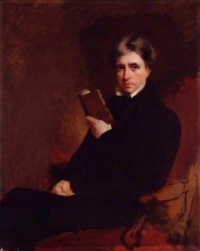
Leigh Hunt
(1784 – 1859)
To John Keats
‘Tis well you think me truly one of those,
Whose sense discerns the loveliness of things;
For surely as I feel the bird that sings
Behind the leaves, or dawn as it up grows,
Or the rich bee rejoicing as he goes,
Or the glad issue of emerging springs,
Or overhead the glide of a dove’s wings,
Or turf, or trees, or, midst of all, repose.
And surely as I feel things lovelier still,
The human look, and the harmonious form
Containing woman, and the smile in ill,
And such a heart as Charles’s, wise and warm,–
As surely as all this, I see, ev’n now,
Young Keats, a flowering laurel on your brow.
Leigh Hunt poetry
fleursdumal.nl magazine
More in: Archive G-H, Archive K-L, Hunt, Leigh, Keats, John
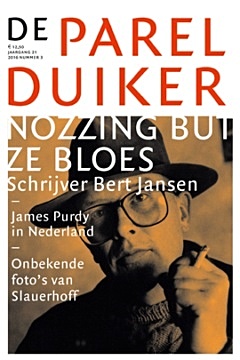 De Parelduiker 2016/3
De Parelduiker 2016/3
Nozzing but ze bloes. Het vergeten schrijversleven van Bert Jansen
Bert Jansen (1949-2002) is de auteur van Nozzing but ze bloes (1975), het gebundelde feuilleton van de jaren zestig, later herdrukt als En nog steeds vlekken in de lakens. Hij publiceerde een groot aantal boeken, maar nog veel meer niet. Zijn archief in het Letterkundig Museum getuigt van vele manuscripten die keer op keer werden geweigerd. Dit lot trof ook het boek dat zijn magnum opus had moeten worden, een biografie van de Drentse blueszanger en streekgenoot Harry Muskee. Voor De Parelduiker ontsluit Rutger Vahl het schrijversarchief van Bert Jansen.
Onbekende foto’s van Slauerhoff
Onlangs kreeg het Letterkundig Museum twee albums met foto’s van Slauerhoff in bezit. Ze zijn afkomstig van Lenie van der Goes, een vrouw die Slauerhoff in 1927 in Soerabaja ontmoette en met wie hij trouwplannen smeedde. Hoewel ze voorkomt in Wim Hazeus Slauerhoff-biografie, is er nog veel onbekend over deze vrouw, die ten faveure van de exotische dichter de brui gaf aan haar kersverse huwelijk met de arts Leendert Eerland. Wie was zij en wie maakte de andere foto’s in het album, waarop Slauerhoff in Macao te zien is?
En verder:
menno voskuil, Ben je in de winterboom. James Purdy en de Nederlandse private press
marco entrop, Tussen wilde zwanen en onsterfelijke nachtegalen.Op verjaarsvisite bij J.C. Bloem
bart slijper, Desperate charges. Tachtigers en sport
hans olink, Het geheim van Buchenwald
jan paul hinrichs, Schoon & haaks
paul arnoldussen, Wout Vuyk (1922-2016)
De Parelduiker is een uitgave van Uitgeverij Bas Lubberhuizen | Postbus 51140 | 1007 EC Amsterdam
# Meer op website De Parelduiker
fleursdumal.nl magazine
More in: - Book Lovers, - Book Stories, Art & Literature News, Bloem, J.C., LITERARY MAGAZINES, PRESS & PUBLISHING, Slauerhoff, Jan
 De Boekenparade is hét grootste boekenevenement van 2016 Jaar van het Boek: van 2 t/m 25 september 2016 staan boeken en verhalen centraal. De focus van het festival ligt op beleving en ontmoeting. De Boekenparade belicht op prikkelende wijze het fenomeen boek in al zijn verrassende vormen en biedt een uitgebreid cross-over programma van evenementen, performances, podiumkunsten, muziek, workshops en een expositie.
De Boekenparade is hét grootste boekenevenement van 2016 Jaar van het Boek: van 2 t/m 25 september 2016 staan boeken en verhalen centraal. De focus van het festival ligt op beleving en ontmoeting. De Boekenparade belicht op prikkelende wijze het fenomeen boek in al zijn verrassende vormen en biedt een uitgebreid cross-over programma van evenementen, performances, podiumkunsten, muziek, workshops en een expositie.
Ook Manuscripta, traditioneel de opening van het boekenseizoen, is dit jaar onderdeel van de Boekenparade en vindt plaats op zaterdag 3 september in de Tolhuistuin.
Pepijn Lanen, Herman Koch en Herman Brusselmans verzorgen de openingsact van de Boekenparade. Verder geven onder meer acte de présence: Griet Op de Beeck, Abdelkader Benali, Michael Berg, Marion Bloem, Joris van Casteren, Renate Dorrestein, Michel van Egmond, Sophie Hannah, Astrid Harrewijn, Patrick van Hees, Arno Kantelberg, Geert Mak, Isa Maron, Tosca Menten, Nelleke Noordervliet, Christine Otten, Hagar Peeters, Dokter Pol, Ntjam Rosie, Mirjam Rotenstreich, Geronimo Stilton en Harmen van Straaten.
In de weekenden vinden aan de IJpromenade tegenover Amsterdam CS grote evenementen plaats en ook doordeweeks zijn er programma’s. De eerste programma’s (het concert met Pepijn Lanen en High Tea & Books) zijn bekend. Op 9 augustus volgt de precieze line-up van de overige events. In de kalender hieronder wordt een tipje van de sluier opgelicht.
Het hart van de Boekenparade is de – culturele en kunstzinnige broed- en ontmoetingsplaats – Tolhuistuin. Daarnaast is er ook programmering in filmmuseum EYE.
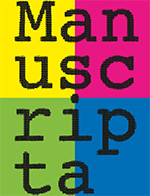 De Boekenparade is, mede door de diverse programmering en de doorlopende exposities, aantrekkelijk voor jong en oud, uit de stad of op bezoek, van laaggeletterd tot boekenwurm: de Boekenparade is voor iedereen. Een dagje Boekenparade is een ervaring, beginnend bij aankomst op het Centraal Station, gevolgd door de pont ofwel de heenenweer, wandelend langs de verschillende locaties en podia waar meegedaan, gegeten, bekeken en geluisterd kan worden. Met één rode draad: het verhaal en het boek als uitgangspunt voor deze ‘reis’.
De Boekenparade is, mede door de diverse programmering en de doorlopende exposities, aantrekkelijk voor jong en oud, uit de stad of op bezoek, van laaggeletterd tot boekenwurm: de Boekenparade is voor iedereen. Een dagje Boekenparade is een ervaring, beginnend bij aankomst op het Centraal Station, gevolgd door de pont ofwel de heenenweer, wandelend langs de verschillende locaties en podia waar meegedaan, gegeten, bekeken en geluisterd kan worden. Met één rode draad: het verhaal en het boek als uitgangspunt voor deze ‘reis’.
02 sept: OFFICIËLE OPENING
02 sept: NAAMLOOS – DE FAVORIETE AVOND VAN PEPIJN LANEN
03 sept: MANUSCRIPTA
04 sept: DIES IST WAS WIR TEILEN
05 sept: START VAN DE WEEK VAN DE ALFABETISERING
09 sept: MEDIABORREL NOORD en DE BETERE BOEKENSHOW
10 sept: HIGH TEA & BOOKS
11 sept: REAL MEN READ & Listen
12 sept: THRILLERS: 100 JAAR HERCULE POIROT
14 sept: CPI KONINKLIJKE WÖHRMANN
15 sept: BOEKHANDEL ATHENAEUM 50 JAAR
15 sept: MORGENLANDFESTIVAL
16 sept: YALBAL
17 sept: YA-WEEKENDER: SATURDAY
17 sept: BOEKVERFILMINGEN
18 sept: Kinderboekenparade aan ’t IJ
20 sept: FRAMER FRAMED
21 sept: MÖHLEMANNS en KÖHLEMANNS
22 sept: KICK-OFF RENEW THE BOOK
23 sept: MIJN WOORDEN ZIJN MUZIEK en AC/DJ
24 sept: SPANNENDE WANDELING EN DOKTER POL
25 sept: KOOKBOEKENFESTIVAL
25 sept: Lancering van lees.magazine.bol
25 sept: NIGHTWATCH MET DIMITRI VERHULST
# Meer info op website Boekenparade 2016
 De Tolhuistuin, adres Tolhuistuin: IJpromenade 2, Amsterdam
De Tolhuistuin, adres Tolhuistuin: IJpromenade 2, Amsterdam
De Tolhuistuin ligt recht tegenover het Centraal Station van Amsterdam. Bij de uitgang aan de Noordzijde neem je de gratis pont ‘Buiksloterwegveer’ om het IJ over te steken.
Pont: Vanaf Amsterdam CS gaat iedere 5 minuten een gratis pont naar de overkant van het IJ (Buiksloterweg, reisduur 3 minuten). De pont vaart dag en nacht, 24 uur per dag.
Bus: Vanuit Amsterdam-Noord is de Tolhuistuin te bereiken met bus 38. De bus stopt direct naast de Tolhuistuin. Op zaterdag rijdt bus 38 om de 12 minuten. Op zondag rijdt bus 38 om het half uur.
Stichting Tolhuistuin
Tolhuisweg 5 – 1031 CL Amsterdam
www.stichtingtolhuistuin.nl
fleursdumal.nl magazine
More in: - Book Lovers, - Book News, Art & Literature News, Herman Brusselmans, Literary Events, Peeters, Hagar, Renate Dorrestein
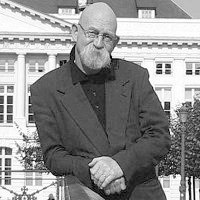
Hiroo Onoda zit 29
jaar zonder nieuws
Thuis groeide een compleet nieuw
geslacht op terwijl hij door gebladerte
spiedde, voortdurend op zijn hoede:
maar niemand duurde almaar langer.
Pal in zijn oerwoud, van alles afgesneden.
Het zwaard nooit wijkend van de zij,
geweren tot vervelens toe gesmeerd.
Hij had geleerd hoe stand te houden.
Dagelijks menu banaan, gedroogd soms,
en vogels uit de lucht. De slapen licht
en bol van zege. Meer dan tienduizend
dagen en nachten de vijand in het hoofd.
Zelfs een havik is tussen kraaien een arend,
o zoon van de bloedrode zon.
Bert Bevers
Uit: Onaangepaste tijden, Zinderend, Bergen op Zoom, 2006
fleursdumal.nl magazine
More in: Archive A-B, Bevers, Bert
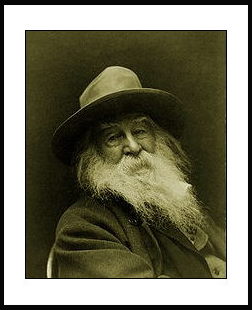
Walt Whitman
(1819 – 1892)
Poets to come!
1
Poets to come!
Not to-day is to justify me, and Democracy, and what we are for;
But you, a new brood, native, athletic, continental, greater than before
known,
You must justify me.
2
I but write one or two indicative words for the future,
I but advance a moment, only to wheel and hurry back in the darkness.
I am a man who, sauntering along, without fully stopping, turns a casual
look upon you, and then averts his face,
Leaving it to you to prove and define it,
Expecting the main things from you.
Walt Whitman poetry
fleursdumal.nl magazine
More in: Archive W-X, Whitman, Walt
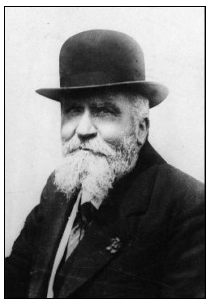
Jean Jaurès
(1859 – 1914)
La Couleur Fille De La Lumière
Pourquoi la couleur ne serait-elle pas un produit de notre sphère? Pourquoi ne supposerait-elle pas des conditions qui ne soient pas réalisées dans l’indifférence de l’espace infini? Elle ne se manifeste aux sens qu’à la rencontre de la lumière et de ce qui est essentiellement contraire à la lumière, les corps résistants. Pourquoi donc supposer qu’elle est déjà contenue dans la lumière? On a la ressource de dire qu’elle s’y cache et qu’elle attend, pour se montrer, que la libre expansion de la clarté rencontre un obstacle. Mais il est permis de penser aussi que ce qui se cache si bien n’existe pas encore ; la couleur est fille de la lumière et de notre monde corporel et lourd. Pourquoi en appesantir la lumière elle-même dans son expansion une et simple à travers l’infini? Quel sens auraient le vert et le rouge dans les espaces indifférents? Ici ils résultent de la vie et ils l’expriment dans son rapport avec la lumière; hors de la sphère vivante, ils n’ont pas de sens . . .
Par les couleurs, la lumière fait amitié avec notre monde: la couleur est le gage d’union; la matière pesante peut enrichir l’impondérable en manifestant d’une manière éclatante ce qui se dérobait en lui; l’obscurité, en faisant sortir les couleurs de la lumière, lui vaut, dans notre sphère, un joyeux triomphe; et la lumière en même temps, en s’unissant à la matière pesante dans la couleur, l’allège et l’idéalise: rien ne demeure stérile; tout fait œuvre de beauté. Les molécules dispersées dans l’air nous donnent les splendeurs du couchant; l’obscurité infinie des espaces vides, se répandant dans la clarté du jour, l’adoucit en une charmante teinte bleue; le mystère même de la nuit et la brutalité de la lumière, saisis au travers l’un de l’autre et l’un dans l’autre, conspirent à une merveilleuse douceur: le jour manifeste la nuit; car, plus la lumière est abondante et pure, plus le ciel est profond, et plus le regard devine l’immensité des espaces qui sont au delà; et le soir, quand le voile de clarté tombe pour laisser voir la nuit à découvert, on la trouverait bien vulgaire et bien triste, si elle ne s’emplissait lentement d’un autre mystère.
Devenue expressive dans la couleur, la lumière s’est rapprochée du son: elle peut concourir avec lui à manifester l’âme des choses; tandis qu’un son qui s’élèverait dans la pure clarté serait comme une voix dans le désert, sans rien qui la soutienne ou lui réponde, les sonorités du monde s’harmonisent à ses splendeurs. La magnificence ou la tristesse des teintes correspond à la plénitude joyeuse ou à la douceur voilée des sons: la lumière, dans sa lutte et son union avec l’obscurité, est devenue dramatique, et elle s’accorde avec un monde où tout est action; l’ombre, en pénétrant dans la clarté, y a glissé d’intimes trésors de mélancolie que le bleu pâlissant du soir communique à l’âme, et la sérénité impassible de la clarté pure est devenue, au contact de l’ombre qu’elle dissipe en s’y transformant, quelque chose de plus humain, la joie.
Jean Jaurès poésie
fleursdumal.nl magazine
More in: Archive I-J, Jaurès, Jean
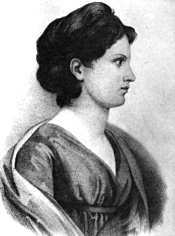
Karoline von Günderrode
(1780 – 1806)
Der Gefangene und der Sänger
Ich wallte mit leichtem und lustigem Sinn
Und singend am Kerker vorüber;
Da schallt aus der Tiefe, da schallt aus dem Thurm
Mir Stimme des Freundes herüber. –
„Ach Sänger! verweile, mich tröstet dein Lied,
Es steigt zum Gefangnen herunter,
Ihm macht es gesellig die einsame Zeit,
Das krankende Herz ihm gesunder.“
Ich horchte der Stimme, gehorchte ihr bald,
Zum Kerker hin wandt’ ich die Schritte,
Gern sprach ich die freundlichsten Worte hinab,
Begegnete jeglicher Bitte.
Da war dem Gefangenen freier der Sinn,
Gesellig die einsamen Stunden. –
„Gern gäb ich dir Lieber! so rief er: die Hand,
Doch ist sie von Banden umwunden.
Gern käm’ ich Geliebter! gern käm’ ich herauf
Am Herzen dich treulich zu herzen;
Doch trennen mich Mauern und Riegel von dir,
O fühl’ des Gefangenen Schmerzen.
Es ziehet mich mancherlei Sehnsucht zu dir;
Doch Ketten umfangen mein Leben,
Drum gehe mein Lieber und laß mich allein,
Ich Armer ich kann dir nichts geben.“ –
Da ward mir so weich und so wehe ums Herz,
Ich konnte den Lieben nicht lassen.
Am Kerker nun lausch’ ich von Frührothes Schein
Bis Abends die Farben erblassen.
Und harren dort werd’ ich die Jahre hindurch,
Und sollt’ ich drob selber erblassen.
Es ist mir so weich und so sehnend ums Herz
Ich kann den Geliebten nicht lassen.
Karoline Günderrode Gedichte
fleursdumal.nl magazine
More in: Archive G-H, Karoline von Günderrode
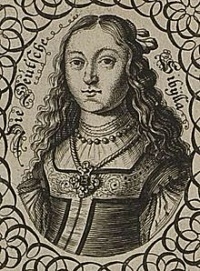
Sibylla Schwarz
(1621 – 1638)
Cloris
Cloris
deine rohte Wangen
deiner Augen helles Licht
und dein Purpurangesicht
hält mich nuhn nicht mehr gefangen.
Ich kan nicht mehr an dir hangen
weil du dich erbarmest nicht
ob mir schon mein Hertze bricht;
deiner schnöden Hoffart Prangen
und dein hönisches Gemüht
krencket mir mein jung Geblüht
daß ich dich wil gerne meiden
wan mich meine Galate
die mir macht dis süße Weh
wil in ihren Diensten leiden.
Sibylla Schwarz poetry
fleursdumal.nl magazine
More in: Archive S-T, SIbylla Schwarz

William Shakespeare
(1564-1616)
O, now, for ever
O, now, for ever
Farewell the tranquil mind! farewell content!
Farewell the plumed troop and the big wars
That make ambition virtue! O, farewell!
Farewell the neighing steed and the shrill trump,
The spirit-stirring drum, the ear-piercing fife,
The royal banner, and all quality,
Pride, pomp, and circumstance of glorious war!
And, O you mortal engines, whose rude throats
The immortal Jove’s dread clamours counterfeit,
Farewell! Othello’s occupation’s gone!
William Shakespeare, “Othello”, Act 3 scene 3
Shakespeare 400 (1616 – 2016)
fleursdumal.nl magazine
More in: Archive S-T, Shakespeare, William
Thank you for reading Fleurs du Mal - magazine for art & literature